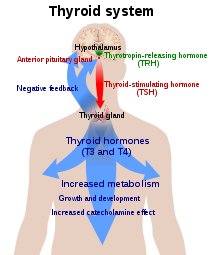Thyroid hormone resistance
| Thyroid hormone resistance | |
|---|---|
| Other names | Resistance to thyroid hormone |
 | |
| Regulation of thyroid hormone | |
| Specialty | Endocrinology |
Thyroid hormone resistance (also resistance to thyroid hormone (RTH), and sometimes Refetoff syndrome) describes a rare
Presentation
The syndrome can present with variable
Causes
Normal thyroid hormone function requires normal thyroid hormone transport across cell membrane, appropriate deiodination, thyroid hormone nuclear receptor, thyroid hormone response elements, co-activators, co-repressors, and normal histone acetylation. Any abnormalities in this chain can result in thyroid hormone resistance and it has not been as well studied as the various forms of insulin resistance.[citation needed]
The most well known cause of the syndrome are
Regulation of thyroid hormone secretion
Hypothalamus secretes a hormone called
Diagnosis
The characteristic
Management
Beta blockers, like metoprolol, are sometimes used to help suppress symptoms.[citation needed]
Incidence
Thyroid hormone resistance syndrome is rare, incidence is variously quoted as 1 in 50,000 or 1 in 40,000 live births.[9] More than 1000 individuals have been identified with thyroid hormone resistance, of which 85% had thyroid hormone beta receptor mutation.[7]
